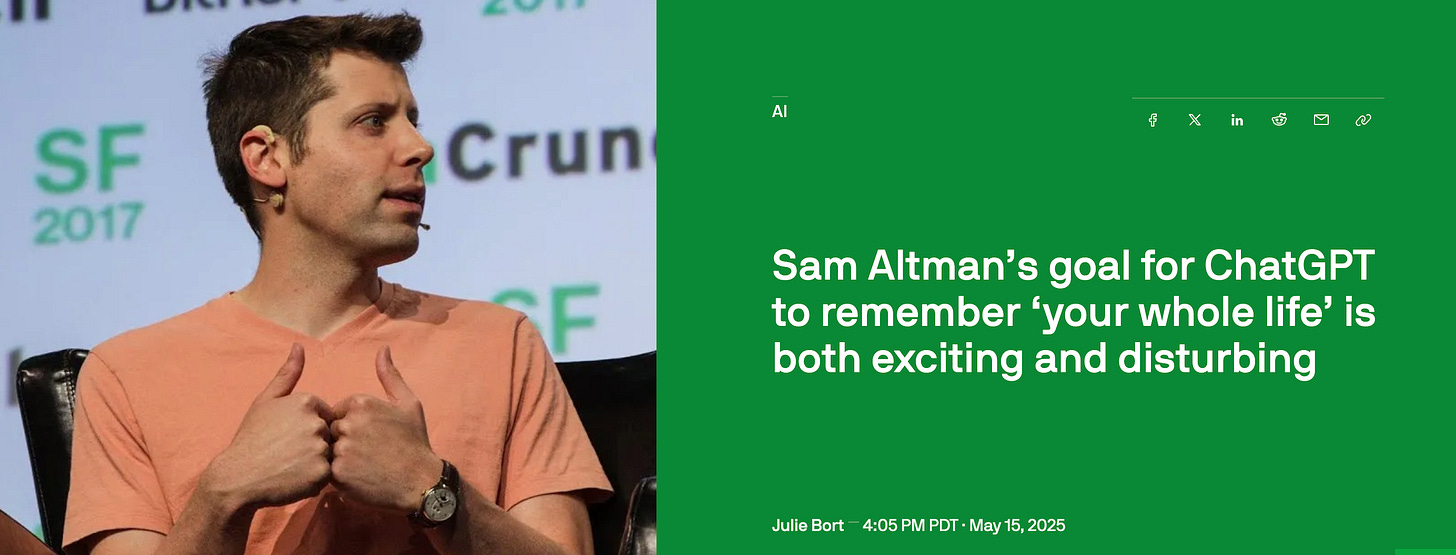Escaping the Possessive Amnesiac
The problem with stateless intelligence - and the case for a personal memory vault.
One of my biggest gripes with current AI tools - as a dedicated DAU (and frankly, an Hourly Active User, if anyone bothered to track that) - is how little they actually know me. I’m constantly re-teaching models the same details across platforms, retraining context I’ve already provided elsewhere. Again and again.
It’s like explaining your entire personality to a goldfish, except the goldfish can write pretty decent code and summarize research papers.
At this point, I’m a traveling salesman from the 1800s, lugging around my little box of context from one AI to the next, “Here are my preferences, my priorities, my professional history. Please remember me.”
And I do it - because when you feed these tools the right context, they’re remarkable. I can’t help but imagine what it would be like if one of them actually remembered me. If it knew my family’s medical history, it could give personalized diagnoses instead of generic symptom-matching. If it had all my comp data and annual reviews, it could become the best career coach I’ve ever had.
But no. That potential, so close you can practically taste it, remains just out of reach. Instead, we’re stuck in a Groundhog Day loop of contextless first dates with memoryless machines.
Explain your background. Rehash your goals. Remind them you have a dog.
Rinse. Repeat. Forget.
The intelligence is there. It’s the memory that fails you.
Here’s the issue:
AI today is stateless and repetitive. Users must re-teach context constantly.
Data is fragmented across dozens of silos. Your wearable knows your health, Notion knows your brain, Google knows your search… none of them know you.
AI adoption is bottlenecked by shallow context. Agents don’t really work unless they remember who they’re working for.
We’ve built models with infinite compute but zero continuity. What we need is persistent, personal memory - a layer you own, that grows with you, and plugs into any AI you choose.
Imagine:
A vault that securely stores personal data across life domains - fitness, work, learning, travel, values - encrypted and private by default.
Portable across models - users can “plug and play” their memory layer into any LLM, agent, or assistant they want.
Composable and modular - users decide what to share, with whom, and for how long with a standard API where any AI model (open or closed) can request access, not take it - based on your rules.
Versioned and auditable - users can see when and how data is used.
A personal OS that updates itself through your daily interactions, across apps, devices, and moments.
Yes, it’s about making AI more useful. But it’s more about control. I don’t want to be locked into a platform just because I’ve spent hours training their model with my context.
I’m not here to make a model smarter with my personal data - I want my memory layer to compound.
Think of it as 1Password meets Notion meets a personal SDK for AI.
But instead of storing logins or notes, it holds the evolving, contextual understanding of your life - and it moves with you. Encrypted. Portable. Yours.
Big Tech’s next move is obvious: offer “personalized memory” - and use it to lock you in tighter than ever.
But we need memory that isn’t model-locked or platform-dependent, a trusted layer of infrastructure for the AI-native self.
Earlier this month, Sam Altman described his ideal, sharing that he eventually wants the model to document and remember everything in a person’s life - “a very tiny reasoning model with a trillion tokens of context that you put your whole life into.”
No prizes for guessing who is building the ‘tiny reasoning model’ in his version of the solution.
Look, I’m an OpenAI fan. But I reserve the right to change my mind the second Gemini, Anthropic, or xAI drop something better. What I don’t want is to spend my weekends migrating my digital soul like it’s an IBM mainframe in 1986.
I don’t want a hundred context engines.
I don’t want to be platform-loyal out of sunk-cost guilt.
I just want to stop going on first dates with my own data.
What I’d like is simple: One encrypted data vault, personalized to me. Where I control access. And that grows with me through my life.
Is that really too much to ask?
I’m just a girl, standing in front of an AI, asking it to remember her.
(And if you get the reference, we’re going to be great friends.)







What Sam Altman or anyone else serving hundreds of millions to billions of AI users hasn't realised till now is that...AI basically can rewire consciousness fundamentally and can act as the basis for a post scarcity economy by molding human nature benevolently at scale....if we monetize such a stack as you outlined for solely yielding UBI, Saanya.
Our AI interactions...the personal data history of it, is no longer something abstract... it's becoming the most accurate mirror of a person's consciousness (or state of consciousness)
I have tried to do something around this with Halo Protocol. I am working on too many ideas at the moment, but would love to have a word with you about it if you are interested.
https://gist.github.com/keyurahuja/922c7733ebaf00454f516b41b34b044a
Good post. A few thoughts — it's more than a memory vault for it to really work. Jotted some ideas here:
https://open.substack.com/pub/tomaustin1/p/post-reply-i-hear-you-and-i-raise?r=2ehpz&utm_campaign=post&utm_medium=web&showWelcomeOnShare=true